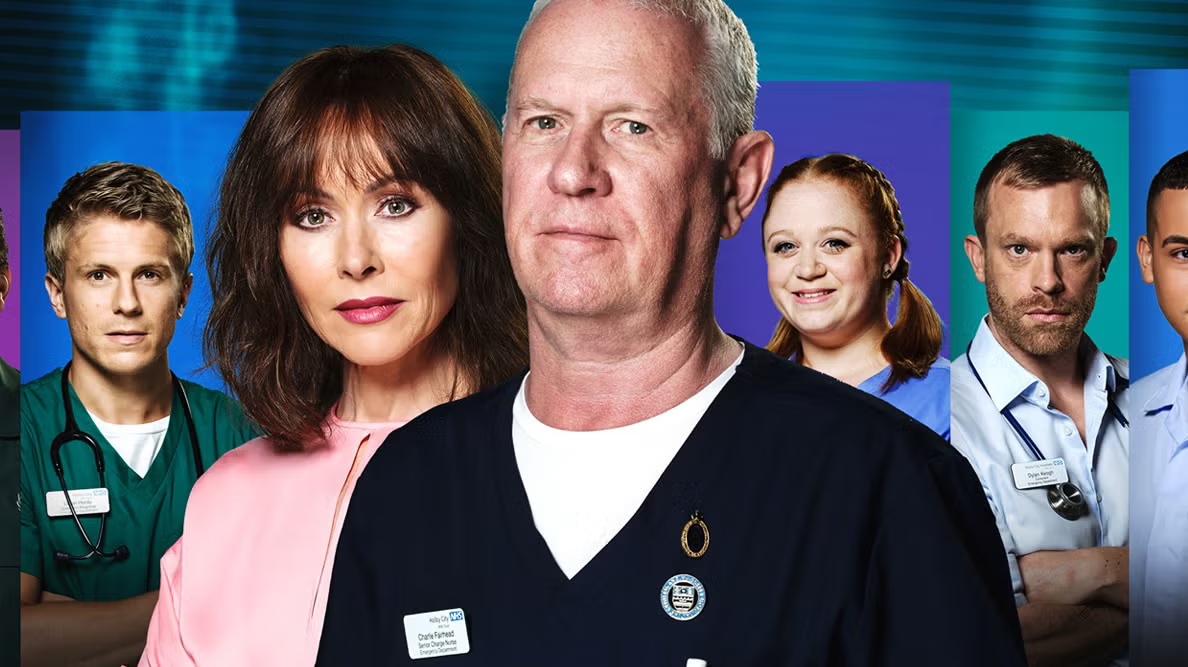
Casualty: an oral history by its stars and creators
- by admin
- Posted on 29 August, 2024
Its success is no… accident.
“In 1948, a dream was born. In 1986, that dream is in tatters,” wrote Paul Unwin and Jeremy Brock at the time of Casualty‘s conception three and a half decades ago. Initially titled Front Line, Casualty was born after the co-creators decided to amalgamate their separate experiences of being in hospital.
In 2021, the show celebrated its 35th birthday and Digital Spy talked to the cast and creatives who made it all happen. We’re republishing that article today as part of our own 25th anniversary celebrations.
We spoke to:
- Jeremy Brock (co-creator and writer, 1986-2021)
- Paul Unwin (co-creator and writer, 1986-2021)
- Erika Hossington (series producer, 2014-2017)
- Oliver Kent (researcher, script editor 1999-2011, series producer 2006-2011, executive producer 2013-2017)
- Simon Harper (executive producer, 2017-2020)
- Suzanne Packer (Tess Bateman, 2003-2015)
- Georgia Taylor (Ruth Winters, 2008-2011)
- Sunetra Sarker (Zoe Hanna, 2008-2018)
- Derek Thompson (Charlie Fairhead, 1986-2024) (speaking to Digital Spy in 2016)
- Cathy Shipton (Lisa ‘Duffy’ Duffin, 1986-2020) (speaking to Digital Spy in 2016)
How it all began
Wanting to fill the medical drama gap left by Angels, the BBC had two ideas for a hospital drama – a ‘cottage hospital’ idea, which was seen as the ‘safer’ option, or an A&E department drama. The Beeb ultimately went with Casualty – but how did such a risqué idea get off the ground in the first place?
Jeremy Brock (co-creator and writer, 1986-2021): “I was working at the BBC, Paul was running the Bristol Old Vic Theatre. Paul and I had been at uni together, and we both had experience of being in hospital for various reasons.”
Paul Unwin (co-creator and writer, 1986-2017): “We thought about doing something about an accident emergency department before you saw that memo. I think I remember you saying, “Oh my God, there’s such a coincidence here. We’ve been talking about doing something like–” We were really inspired by an American TV show called Hill Street Blues, which was very political and funky and direct. So we thought, “Oh, we’ll do that.”
Jeremy Brock: “I can’t remember which came first. What I do remember is the two of us sitting down, and saying, “Look, we’ve both been in hospital. We’ve both had quite some experience at a relatively early age of how incredible the NHS can be.” We loved Hill Street Blues, and we loved MASH. And we had very little experience first-hand of A&E, but we knew there was something in that.”
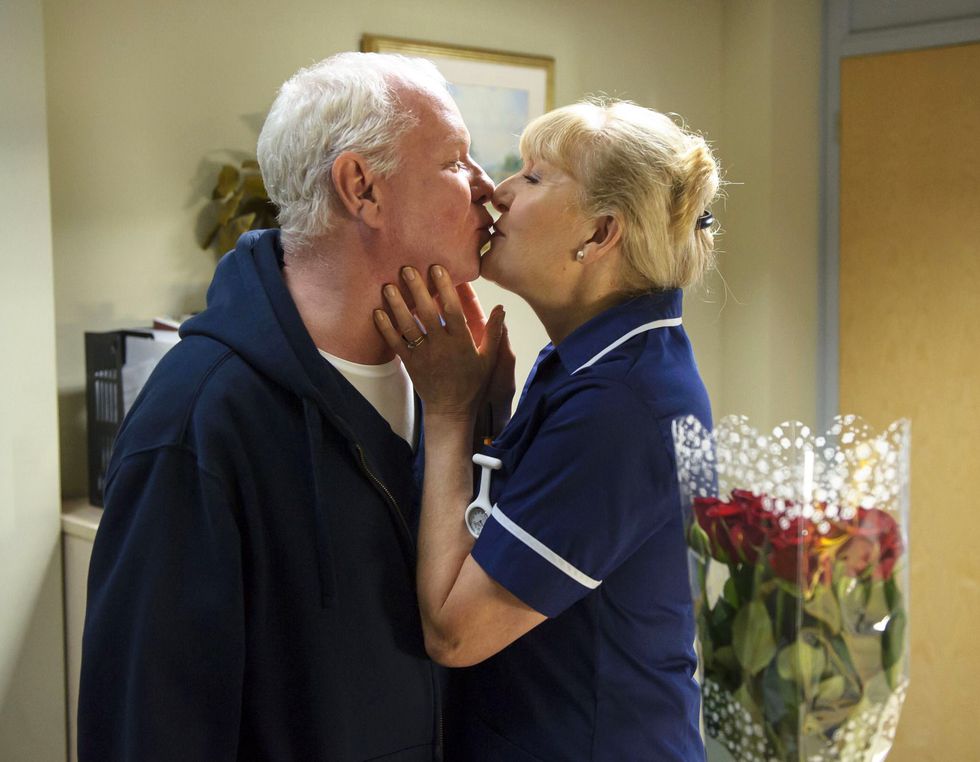
Paul Unwin: “I think what also strikes me is that I had very little experience of A&E, and absolutely no experience of writing television drama. We had worked together in the theatre. Jem is a playwright, and I was directing an early play of his but we’d known each other for quite a while at that point. We had these specific ideas that it would be through the night. It would be a group of characters of the nursing medical staff and the focus of the drama would be much more on reality than on the slightly schmaltzy version that we’d seen on TV. Television had always portrayed nurses and doctors as being these unblemished heroes. But I had spent five months in hospital. I’d seen it close-up. I just thought that these people are amazing – it’s an incredible duress for them and their individual lives.”
Jeremy Unwin: “It was a two-page manifesto, completely under-researched, full of ambition, and full of our excitement about what we thought potentially we could do with a through-the-night drama. And we had certain ground rules, didn’t we? We said the doors opens, and that’s when the story starts, and then when the doors close, it ends. So in the very earliest imagining of the series, we didn’t imagine you ever left. Obviously that got adapted and altered according to what was pragmatic and realistic. We also did lots and lots of research. We went to the Bristol Royal Infirmary and latched onto the most wonderful, wonderful staff nurse called Peter Salt.”
Finding Charlie and Duffy
Paul Unwin: “Discovering Peter was like finding our Charlie and finding the lynchpin and the rock for us. We didn’t know how the television drama side of it worked, and nor did we have much experience of hospitals – what he did was so crucial. Peter is such a hero to us because he understood how our energy works.
“He never patronised us. He always treated every idea, however absurd it might be in reality, with great dignity. We were 25 and he just drew us into his circle of trust, and never made us feel like we were talking rubbish. He understood our ambition to try to portray the NHS as a frontline. Which, of course, ironically, given what’s happened in the last year-and-a-half, it so dramatically is.”
Derek Thompson (Charlie Fairhead, 1985-2024): “Peter was always the maypole that the ideas dance around – he is a genuine charge nurse. They based the character on him and I met him.”

Paul Unwin: “Peter then went on and stayed with the show. When he left, which I think was about four years ago, he had read and noted and developed and made medically sound every episode for 30 years. He went on being a nurse, and then he became a magistrate.”
Derek Thompson: “At the time, I thought: ‘Wow, what a get out of jail card!’ Because if ever I look at a piece of script and think ‘I’m not sure that’s him’, I say: ‘Go and ask Peter Salt about that’.”
Paul Unwin: “I stayed friends with Peter for all kinds of reasons – nothing much to do with Casualty. Just because I was in Bristol. At one point, they were developing two scripts simultaneously, one that was going to get made, and one that was going to go further forwards and he was reading basically two scripts a week for 30 years but he had the same magnitude of care and consideration.”
Cathy Shipton (Duffy, 1986-2020): “At the beginning, everybody spoke RP or wherever they came from, but the two youngest and least experienced TV actors – Debbie Roza and myself – were picked to be local girls. So I sounded like Worzel Gummidge most of the time! Then the producer changed. Peter Norris took over, who’s actually producing Line of Duty now. It was around the time when he was working with Antonia Bird. They wanted to make the show less localised to Bristol and they also wanted it to be grittier and more urban. As the timeslot went later, they were trying to create that urban feel.”
Derek Thompson: “One of my favourite outdoor moments was one of the establishing moments in Casualty‘s very first episode. Charlie drives his little yellow Beetle across the suspension bridge in Bristol up to the hospital and gets out wearing his flying jacket and lights up a cigarette. It felt wonderful to me because it was so humorous; there was all these hard-man symbols but then with a little yellow Beetle!”
Controversy
Casualty is something of a national institution these days, but believe it or not, there was once a time where the writers feared it wouldn’t make it past the first series. The first series of Casualty attracted a lot of political controversy and government condemnation due to its negative portrayal of the NHS, with the Royal College of Nursing, who did not like the way the nurses were portrayed. Despite these initial concerns, a second season of episodes was commissioned, but it was generally thought that no more would be made after that.
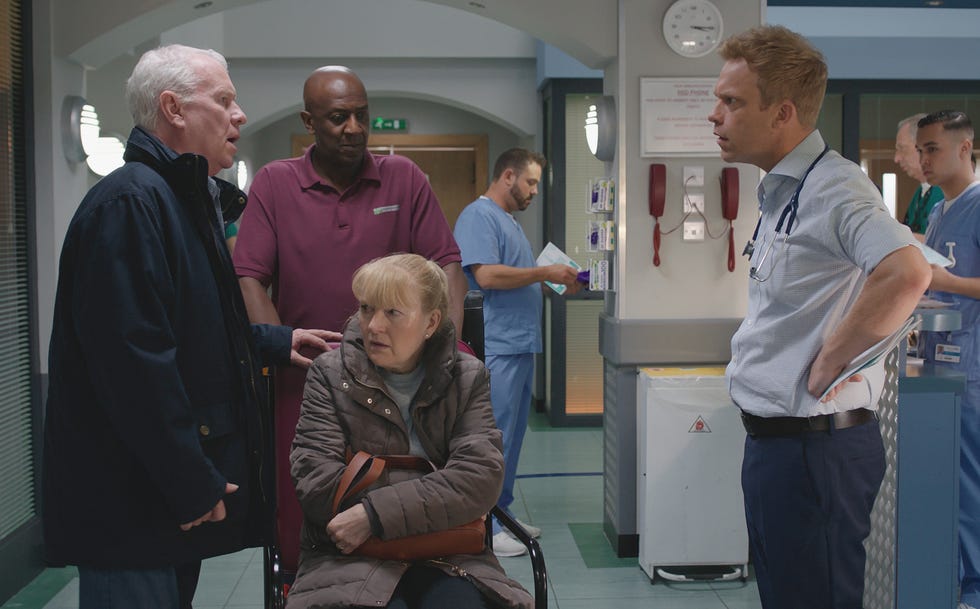
Paul Unwin: “Back at the start, there had been this thing where Edwina Currie, who was an MP then, had stood up in the House of Commons, and said, ‘The BBC is making a political, anti-NHS drama’. It was all over the Sunday Times. We thought, ‘Oh, that’s it, then. We are toast.’ In fact, the reverse happened.”
Jeremy Brock: “We loved the whole Edwina Currie story. We were young enough and arrogant enough and ambitious enough to find all that publicity absolutely delicious. I remember, we just loved every minute of it.”
Paul Unwin: “During the first series, Jem and I were slightly summoned to go to this Royal College of Nursing conference in Nuneaton. We were quite nervous because there’d been in the newspaper stuff saying, “These people are dissing our nursing staff,” and all that. Peter came with us and we knew with him there that we had one of theirs on our side. There was this moment where we were on this panel and facing a room of quite irritated nurses – senior nurses. Someone said, ‘Please raise your hand if you’ve never heard of a member of the nursing staff drinking or taking drugs or being promiscuous?’
“But that question made it impossible. Everyone put their hand up but then Pm a member of RCN, and I have supported these guys. This show is accurate, and it’s trying to show the stress of these staff, and not to criticise them.” It was like a sea-change moment because suddenly having felt like we were the naughty boys – through Peter and through Geraint, it was suddenly like, ‘Oh, well. It’s OK. We trust you’. It was phenomenally successful early on, which was weird. I think it was about 6 million people quite quickly. It was a different world. People watched television in quite a different way.”
Jeremy Brock: “We’ve got to bear in mind that we were pushing at something which the BBC weren’t comfortable with. Like Paul said, the normal kind of way in which a drama about nurses would have been made, would have been Angels, or there was one in the ’60s – I can’t remember. But there was a recipe. There was a way you did it. There was a little bit of a serial element, and there was a little bit of drama. But by and large, nobody did or said anything too controversial.
“I can remember Geraint, our producer, convinced us that we weren’t going to get through to series two. But by the end of series two, we were getting the sort of viewing figures that they couldn’t argue with. So it was saved. But we didn’t feel safe at all in that first year. We just felt excited. We were prepared to push it, and go for it as much as we could.”
Simon Harper (executive producer, 2017-2020): “It had quite a crusading nature to it. I hesitate to say that it’s political, because obviously when you make a BBC show, you can’t be politically partisan. It’s not political if it shows things that are undeniable. You’ve got to tell what’s happening in the NHS. So if the NHS is underfunded, and it’s over-stretched, then you show that. I don’t think it’s a political statement to say that, because it’s a sort of undeniable truth.”
Cathy Shipton: “For me, my taste is for Casualty to be political with a small ‘p’. It can still be issue-based. Even if you look at the Huntington’s Disease storyline with Carol Royle, George Rainsford and Richard Winsor. I call that ‘political’, because it’s exploring social politics. It’s about caring, palliative care, end of life and terminal illness. I think it’s great when Casualty gets stuck into an issue like that. There was also a storyline focusing on an FGM issue. So it doesn’t necessarily have to be junior doctors shouting at Jeremy Hunt or whoever else is up there.”
From series to serial
Although it’s famous for its standard Saturday night slot, there was a period between the late ’80s and early ’90s where Casualty switched to Fridays. While the early series approximately consisted of between 10 -15 episodes, the series length was extended to 24 episodes per year when it moved back to its Saturday night schedule in 1992. By 2005, the show had transitioned from a traditional seasonal format (which had progressed from three months in its early years to around seven months by 2001) to an almost year-round production and transmission.
From series 26, which kicked off in the summer of 2011, the show also began broadcasting in August of their respective years, rather than at the start of September with a two-week break in late December. The long summer break, between each series, has now been scrapped entirely.
Derek Thompson: “In the early days we did 13 episodes per series, then 10 episodes, then 15 episodes, then it built up. Now we’re doing anything between 42 and 48 episodes per series and people expect that long graft, with the storylines that are the ‘soap opera’ element. These days, that aspect of the show is actually much gentler. You’d expect it to be fiercer, but it’s actually much gentler because in the early days, you had to hit people with a big storyline within 13 episodes. You had to get to the end – or at least the thick middle bit – within those 13 episodes. These days, you can set up the far pavilions in episode one and you don’t have to get there until episode 32. It’s a very different show to the one that had the 13-episode format.”
Oliver Kent (researcher, script editor 1999-2011, series producer 2006-2011, executive producer 2013-2017): “I didn’t find it [the episode increase] made much difference, but that’s probably partly because the time in between me being at Casualty the first time and coming back, I’d spent my time on three different long-running dramas. So there was EastEnders, Holby City and a radio drama called Westway.
“I’d become very used to shows that ran year-round. And I think pretty much everybody had taken it in their stride. Some will tell you differently, but I didn’t find that it was crazily more difficult.”
Cathy Shipton: “When it first started, it was always felt that the individual episodes should be able to stand alone. Myself and Derek just did this Gogglebox format for iPlayer and watched 14 clips of Casualty history over the 30 years. The earlier ones were just so crisp. It was great. Yes the sets looked less impressive but the standard of the episodes was great.”
New era, new faces
By 2007 things had rapidly changed. Many of the show’s original cast had left, with the exception of Charlie. As a result, the show then underwent somewhat of a subtle overhaul, birthing a new wave of memorable characters. Series 22, which began on 8th September 2007, saw the arrival of many new characters, including Ruth Winters (Georgia Taylor) and Toby De Silva (Matthew Needham), consultants Adam Trueman (Tristan Gemmill) and Zoe Hanna (Sunetra Sarker), Big Mac (Charles Dale), Receptionist Noel Garcia (Tony Marshall), and many more.
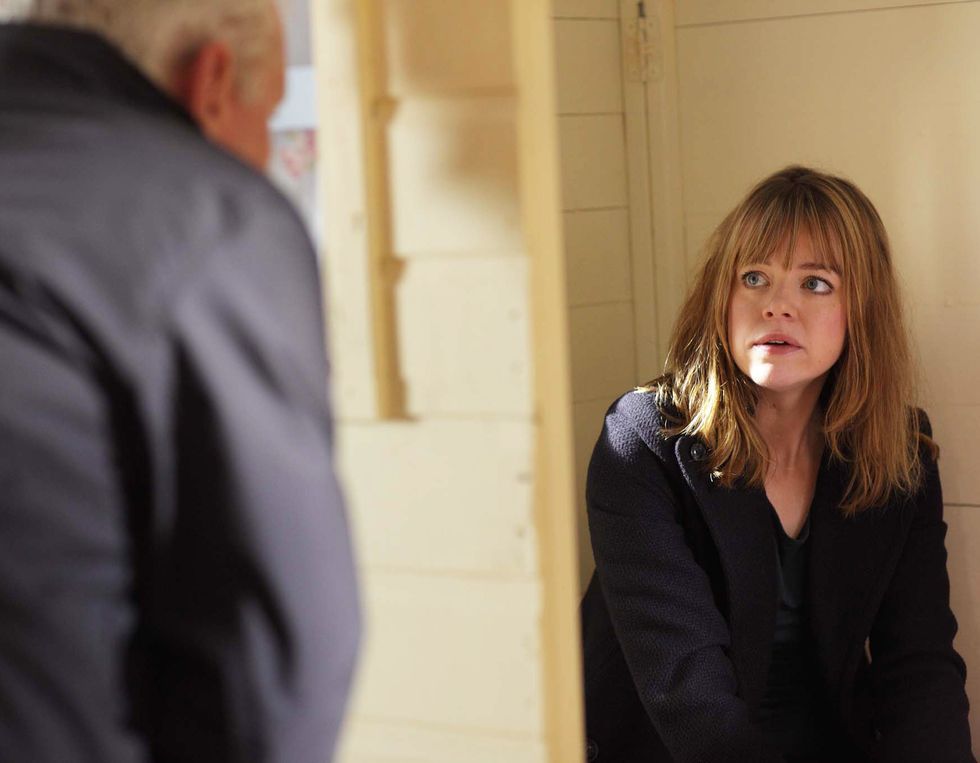
Georgia Taylor (Ruth Winter, 2008-2011): “There was a huge influx of new people. We all joined within about six months of each other. It almost was like a complete turnover of cast in that first year. I think a lot of people had just left in the last series and so it was all new people. We were a really tight, little team. I think of the regular cast, it was maybe 14, 15. It’s not like a soap where you’ve got 60, 70 people. I’ve still got really close friends from that job to this day. It was an exciting time.”
Sunetra Sarker (Zoe Hanna, 2008-2018): “I remember going and having to deliver a huge long medical life-saving speech and not having a clue whether I was pronouncing the medical words right. The casting director Ben Cogan was so helpful and made me feel like I had a friend in the room as the series producer and another producer was in the room with us.
“I also remember really enjoying the feeling when I left the room, like I knew I had done my best and so I wouldn’t mind if I didn’t get it. But when I got the phone call to say I got the job, I remember I yelped out loud on the train! A few strange looks from passengers but I really couldn’t believe it. Three years was a big contract even back then.
“Zoe was a great character to play and the writers had a field day with her chaotic lifestyle and lack of self care! She fell over toilet cubicles, got engaged to numerous consultants, lied to management, performed operations in unorthodox ways and smoked cigarettes outside next to the ambulances!” Her opening story of arriving as the mistress of a consultant whose wife was Jessica (a nurse on the show) was a great intro to the car crash world of Zoe. I loved being the other woman and not playing a cuddly doctor who loved kids, and then she found out she was sort of quite liked by kids when Sharice – a child patient – ended up needing fostering and Zoe stepped up.”
Suzanne Packer [Tess Bateman, 2003 – 2015]: “I was visiting from New York as I was living there at the time, and my agent asked if I wanted to be seen for Tess. She was a character I knew I could fall into immediately as I had been around nurses all my life and so I identified with her high standards and professional competence. It was at a time when I really wanted to come back to the UK so the timing couldn’t have been better.
“I had worked with Foz Allan before, who was the Series Producer at the time, and we were friends, so he said to come for lunch at the warehouse in Bristol first so we could catch up and then I had the audition afterwards. It was filmed and I remember it was the good old days when you didn’t have to have it learnt but be familiar enough with the lines so you could look up and engage with the casting director who was reading the lines off camera. It was a very relaxed audition. Within a few hours of arriving back in Cardiff I was offered the job.”
Georgia Taylor: “I actually turned down the audition to start with. My agent came through, and said, “Oh, Casualty‘s been on – they want to meet you for this new character, this junior doctor who’s starting.” I had a bit of a think about it. I’d been out of Corrie at that point, I think for about four or five years, and I’d done other stuff and I didn’t feel that I wanted to go into another long-running job. I didn’t feel that I was ready to make a commitment like that. I went back and said, ‘Thanks so much for thinking about me but I just don’t think it’s the right fit for me at the moment; but they came back and said, ‘Listen, it’s actually only a six-month contract, and it is finite, because the character will die at the end of it.’
“I thought it sounded like a really interesting story, and knowing it had a beginning, middle and an end, I decided to go for it. Ruth’s story had a really nice arc, and it did have a satisfying ending. I don’t feel like there were loads of loose threads. In the end, she had a really lovely exit and got a happy ending. Who’d have thought that the character of Ruth would have that kind of send-off? You think it would be something tragic, but it was something really sweet.”
Oliver Kent: “The casting of Georgia was a masterstroke. I’ll never forget when she came in to audition. For a start, we were lucky that she even came in to read. She just nailed it from that very first scene reading. There’s just something incredibly clever about Georgia’s performance. The story originally was that Georgia and Ruth were only going to be in the show for six months.”
Georgia Taylor: “I ended up loving the people, loving the challenge. I loved the character and I felt sad that it was going to come to an end. Luckily, the producer phoned me and said, ‘Listen, how would you feel about staying on a bit longer’. We still did the storyline, which was that my character was going to attempt to take her own life, but she was found and stopped in time.
Oliver Kent: “It’s an example of hiding a story in plain sight. We had this plan whereby we would tell the story of a medic over six months, who would then, out of nowhere, seemingly take her own life, and then the audience would be forced to see what had built her up to that pressure that her mental health deteriorated that badly, and how well she covered it up, in order that nobody noticed it. But Georgia was so amazing that we very quickly started saying to her, ‘Actually, what if you stayed?'”
Bye-bye Bristol
In March 2009, the BBC confirmed that Casualty would move from Bristol to Cardiff after more than 20 years, to sit alongside productions including Doctor Who and Torchwood, as part of a plan to double network TV production from Wales by 2012. The last episode in Bristol aired on the 10th December, 2011.
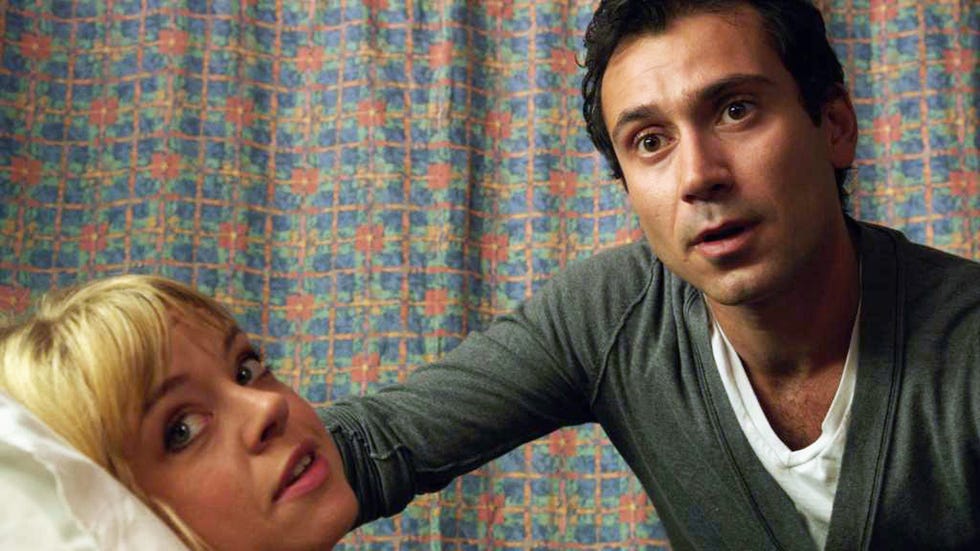
Oliver Kent: “The move did make a difference. It made some differences that were not as positive, but overwhelmingly it was much more positive. And one of those was the simple fact that it was a purpose-built studio with a purpose-built— actually, two purpose-built backlots. It was much more economical to shoot. And it meant that the budget effectively went further, because, you know, a simple factor of when we were back in Bristol, we wanted to film outside the A&E. That was quite a long drive, and it would take half a day – minimum – just to do one scene. It was a bit of a faff. Whereas in Cardiff, it’s just there. It’s where it was meant to be. So it isn’t in any way a problem to do exterior scenes. Those exterior scenes really made the place seem real.”
Georgia Taylor: “I remember (BBC head of drama) John Yorke came and spoke to us all about the move, about two or three years before it happened. I’d just bought my house in Bristol and it had just gone through the week that we found out the show was moving to Cardiff! But logistically it’s a huge thing to organise and it still took a few years after that.
“My contract ended around May, and Casualty asked me to stay on until the end of August, which was the very last episode in Bristol. They said, ‘Can you just do an extra three months to tie up the story and then it will be the final episode in Bristol?’ My last episode saw me and Ben [Turner, who played Jay Faldren] driving over the suspension bridge. A couple of weeks later, they all moved to Cardiff. The move didn’t necessarily affect my decision but I think it worked out for the story.
“We were really lucky and it was very sweet that they gave us that last shot. We were saying goodbye to Bristol on behalf of the show that had been there for over 20 years.”
Oliver Kent: “In production terms, it was great, and all of the post-production that was onsite, is onsite. And all of the design work, it’s all done in the same building. There were some unfortunate features of the building itself which didn’t live up to what we got used to in Bristol. It’s simple things. In Bristol, the building was designed— it wasn’t “designed”; it just happened to be that you could see everybody. In Cardiff, the set is sort of downstairs and away from the production office. Rightly or wrongly, the fact that the show is now – and obviously has been for a long time now – is further away from London, means that there are some people who won’t want to get involved in the show. And that’s regrettable, because Cardiff is a great place. But it’s something that didn’t really affect us in Bristol so much.”
Suzanne Packer: “I would’ve liked to have worked in Cardiff for longer. Selfishly it was so close to home. The commute to Bristol everyday was really tiring. I did eight years of it!”
Memorable storylines
From Charlie and Duffy’s on-off romance, to Adam’s HIV, to Ruth’s breakdown, to Connie’s 30th anniversary literal cliffhanger, the cast and crew reveal which storylines meant the most to them.
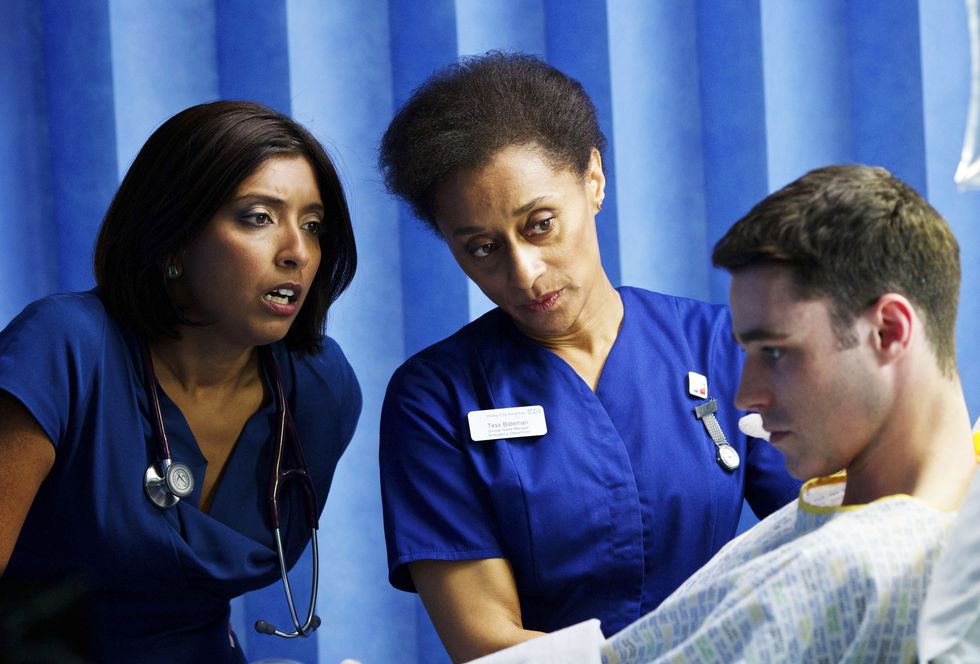
Oliver Kent: “Back in the ’90s, one of the stories that was our most controversial stories was when we had male, gay nurse character called Adam Osman who had HIV. That was at the time really, really controversial and taboo. A lot of people phoned up about us actually doing that story. So that was really interesting to explore, all of that. We had the same character go on to have the first gay wedding on a British TV drama when he married Rueben. That was a great story to be across – it just shows how much times have changed.”
Georgia Taylor: “Ruth’s bipolar story was a huge responsibility, but I think handled really well, and really sensitively. There was a lot of research that went on, and I had a lot of time with professionals in that area who I could ask anything to, basically. It’s one of the biggest storylines I’ve had in any job I’ve done, to be quite honest in terms of the workload and the responsibility, and the very heavy nature of it.”
Oliver Kent: “I was really proud of that character [Ruth], and that story, and about telling the rites of passage in real time of a character with those struggles. It was probably one of my favourite things that we did. It became a story about recovery, and about mental health, and about mental wellness. It wasn’t always a story about her being mentally ill. Mental wellness actually became a big part of it.”
Suzanne Packer: “The storyline in which Megan Roach (Brenda Fricker) returned to die and Charlie and Tess assisted. What a joy to work so closely with two amazing actors. And the FGM episode was such an important subject to cover and it really tapped into the show’s strengths of being topical and bold, and that combined with a great script and solid acting and directing made it a very notable episode and deserving of the award and praise it got.”On the other side, it was particularly satisfying to play the episodes in which Tess has an affair with her colleague and the fallout from that. It was great to play another side of her and to see her vulnerability in her personal life.”
Sunetra Sarker: “If I had to name my all-time favourite episode it would probably be ep501 written by Barbara Machin, when Zoe got to have a sliding doors episode and relive the day twice. I found that exciting both on and off screen.
“Another favourite story was the helicopter crash when Zoe went out to save a patient instead of being clinical lead indoors and realised she preferred being a hands-on emergency doctor to a clinical lead with admin duties. She handed in her resignation and rebooted herself to the good old sassy Zoe she was before the office job. One story I particularly single out as a standout ep is the FGM storyline when we addressed an issue rarely seen on TV.”
Oliver Kent: “Keeping Charlie front and centre is something I will always be proud of. I also loved Ethan and Cal; the Cain and Abel brothers, who, interestingly, when they were very first dreamed up, were meant to be twins called Leo and Lars. Obviously we moved on from that.”
Erika Hossington (series producer, 2014-2017): “For me, one of the defining moments editorially was Connie coming in as clinical lead when Amanda Mealing came over from Holby. We wanted a female clinical lead and thought Connie would be brilliant in that role. I was also really proud of the Zoe and Max storyline, introducing Cal and Ethan, Charlie and Duffy’s wedding and Charlie’s stag-do. I always remember my story producer, Stuart Cheetham, saying to me, “We married Charlie and Duffy. We were all a bit giggly about it.”
Oliver Kent: “Casting Richard [Winsor] and George [Rainsford] was a really lucky stroke. We were lucky to get them both. We were lucky that they both happened to be available at the same time. The chemistry between them – because they’re such close friends – really informed the way that they played together. Everybody loved writing them. I also loved the character of Lofty.”
Erika Hossington: “The Zoe and Max success was down to Jamie [Davis] and Sunetra, and how they worked together. The writers found them delightful and easy to write for. I do think it’s one of the great love stories of the show’s history. I would say that, because it was in my era, but I really do believe that. It was hard at first because there was such a huge following for Jordan and Zoe initially. But Michael [French] had left the show and we loved Zoe and wanted to give her something new. Sunetra had been on the show for a long time – she needed some new material, and some new things that she could really get her acting chops into because she’s a great actor.”
Sunetra Sarker: “I never believed Dr Zoe and Max the Porter story would work! The age difference and status difference seemed too major. I think originally it was just meant to be a short story to introduce Max and then the writers and producers kept bringing us together for more comedy and romance. I think we, as actors and the audience, started believing we could see it playing as a bit of a chalk and cheese combo actually having a lot of fun and chemistry. Thankfully, Jamie and I also got on really well and remain great friends still, so I was lucky that we both wanted to work on making the best we could with this pairing.
“The storyline where she admitted she couldn’t have kids to both Jordan and Max were both so very different and showed how Zoe had grown in the years between both those loves of her life. The first love of her life was probably Jordan but then the biggest love who loved her back equally was Max. He was the first man to make her step up and address real life and she laughed with him in a way she hadn’t before. The episode when Zoe was a Porter for the day was one I dreaded but Jamie and I really worked to make it fun for our characters and so we ended up having a soft spot for that one.”
Simon Harper: “I was really proud of ‘The Year of the Paramedic’ in 2018. Not only was that a fantastic story for Ian – it’s continuing drama at its best when you can tell a real story like a mental breakdown in real time. That’s what I think is the power of continuing drama but also that it says something quite profound about the state of the nation, or the pressure that the NHS is under. I was very proud of the Alicia story. We did that very much on the cusp of the whole hashtag #MeToo being in the news. That was really interesting.”
Oliver Kent: “The 30th anniversary episode is a highlight for me too, where we crashed the helicopter into the hospital. That was wonderful.”
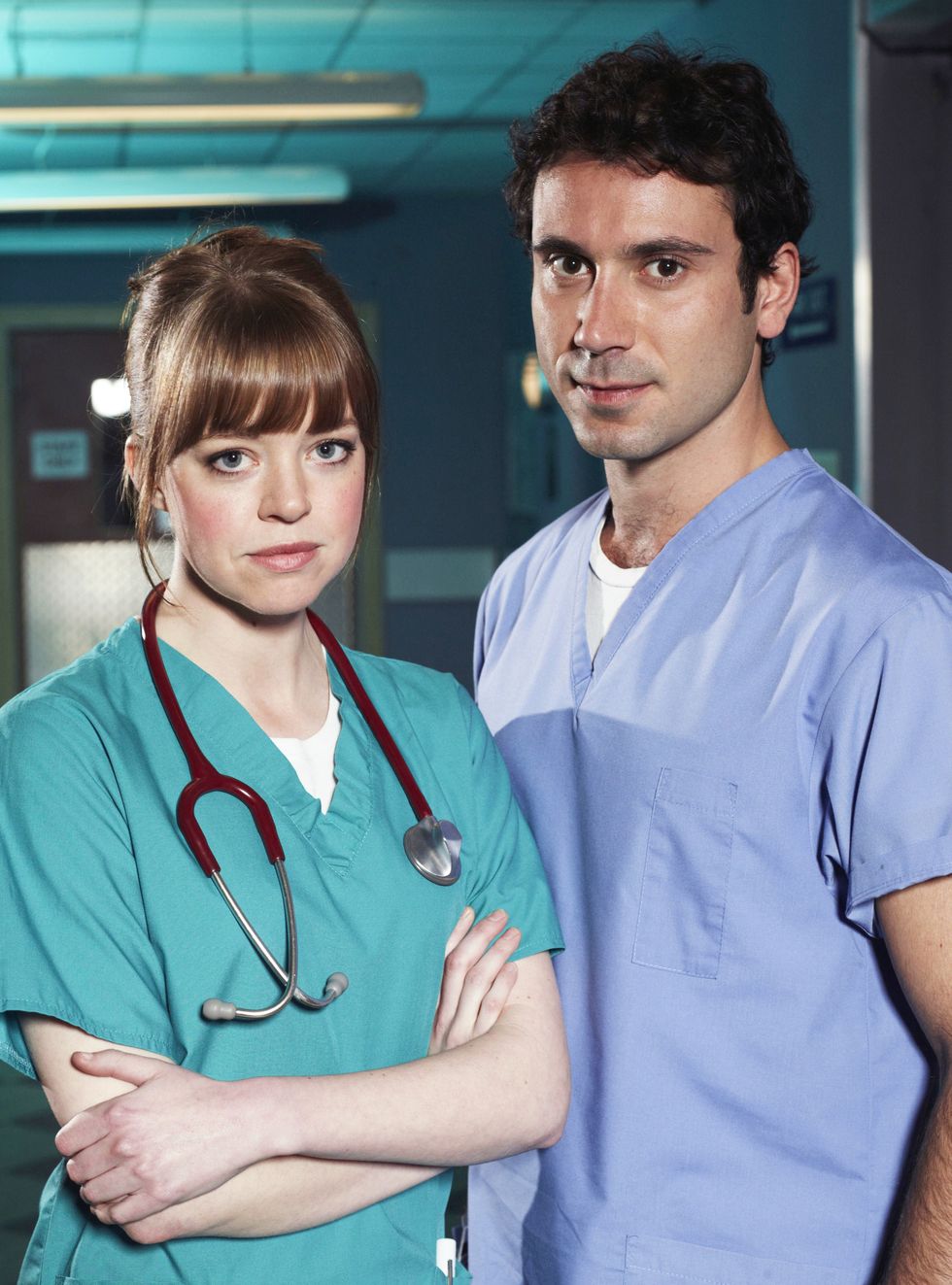
Simon Harper: “I was very proud of the Alicia story as well. We did that very much on the cusp of the whole hashtag #MeToo being in the news. That was really interesting. Duffy’s dementia story was also fantastic. We had an opportunity to sort of say something, really, about the state of the nation.”
Derek Thompson: “I think the most memorable for me is the one with Charlie’s son, Louis; a drug story which took us to Romania. That was quite an experience. And all the subsequent episodes where you chartered his story of constant struggle and Charlie’s real battle with the gods trying to change things or support his son in a way that is near impossible. Gregory Foreman, the young actor who played Louis, was great to work with and we got something that was very strong and very hard-hitting.”
Erika Hossington: “The one-shot episode will always be one of my highlights. Everybody was so supportive and helpful to each other. It was really special. I certainly will never forget it, because I think it’s probably a once-in-a-lifetime kind of thing.”
Oliver Kent: “We wanted to do a live episode but nobody would let us. We thought that if we could prove that an episode can be done in one shot, then it therefore proves that it can also be done live. This was the secret way of proving that it could be done but we failed to win the argument!”
Staying power?
While sister show Holby City sadly closed its doors in 2022 after 23 years on air, Casualty is, thankfully, still going strong after three and a half decades. But what exactly is the key to its success? And what could the future of Casualty look like?
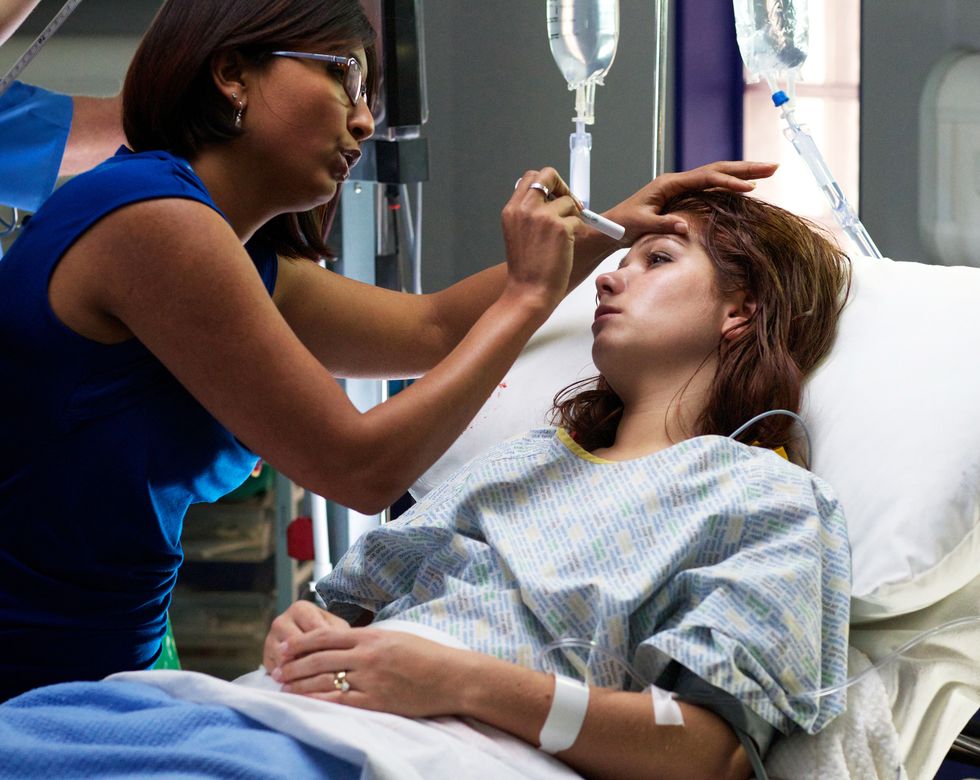
Simon Harper: “Casualty can’t really go out of fashion because it’s about the NHS, and it’s set in an NHS hospital. And as a nation, we love our beloved and magnificent NHS. I think onus on guest stories helps, and always having fresh writers. There’s always new stories to tell, and there’s always new characters to bring.”
Paul Unwin: “We talk endearingly about how it was a kind of accident that this happened. I think that’s true to a point. I also think that we both had real exposure, at a young age, to being ill. I was writing out my time in hospital. I was trying to explain to myself the grief that I went through, the thankfulness I went through, the fear I went through. At the core of what we were doing with Casualty was going— you know, I was 19, I had a car crash. I suddenly woke up in a hospital bed, really, really, really ill. You go, “Oh my God, there’s a whole system that’s going to embrace, and look after me, and hold me.” To this day, I still believe that all those things that I’ve been through are the product of those people looking after me and holding me. And that’s what I was trying to write about in Casualty – or trying to get Casualty to be.”
Erika Hossington: “You never have to work hard to keep the show relevant. The show is about the people who work on the frontline of the NHS. All of us that work on the show, care passionately about the NHS, and are huge advocates and supporters of the NHS, and take our responsibility very seriously to do so.”
Sunetra Sarker: “The key is telling real stories that are truly happening in EDs everyday. Making our regulars human, brilliant and vulnerable all at once. Yes I think with the creativity flowing from all departments, this show has the magic to run for another 35!”
Suzanne Packer: “There is a comfort around the show which comes from familiarity with the way the show is structured. Comfort and familiarity is very habit-forming. Also the characters are recognisable and attachment grows particularly to the ones who have been on our screens for such a long time. Who doesn’t love Charlie? Probably the sense of connection is the most enduring quality as most if not all of us have had some experience with the great NHS.”
Georgia Taylor: “As a child, I remember feeling that the show was really thrilling and exciting when watching it as a child. It was always fun trying to guess what the accident was going to be. I have really fond memories. It has such brilliant guest actors every week, and it has a standalone story, meaning you can always dip in and out of it as well.”
Derek Thompson: “The same reason it always has been: because the quality of work and because it has maintained its standards over the 35 years. There’s a great deal of social realism in the show and it also manages to do some quite spectacular stuff which doesn’t feel like spectacle for the sake of spectacle. The quality of work and the quality of thinking has been consistent for 35 years and I’ve had a grandstand seat for it. I’m immensely proud of the fact it’s achieved 35 years.”
Oliver Kent: “Ultimately, the reason that the show endures is because the format is so strong. Over the years, when the show hasn’t been at its strongest is when the format’s not been respected. In that sense, the format was always what it was. The format was always: frontline; present tense; a show about nurses.”
Casualty airs on Saturdays on BBC One.
Its success is no… accident. “In 1948, a dream was born. In 1986, that dream is in tatters,” wrote Paul Unwin and Jeremy Brock at the time of Casualty‘s conception three and a half decades ago. Initially titled Front Line, Casualty was born after the co-creators decided to amalgamate their separate experiences of being in hospital. In 2021, the…